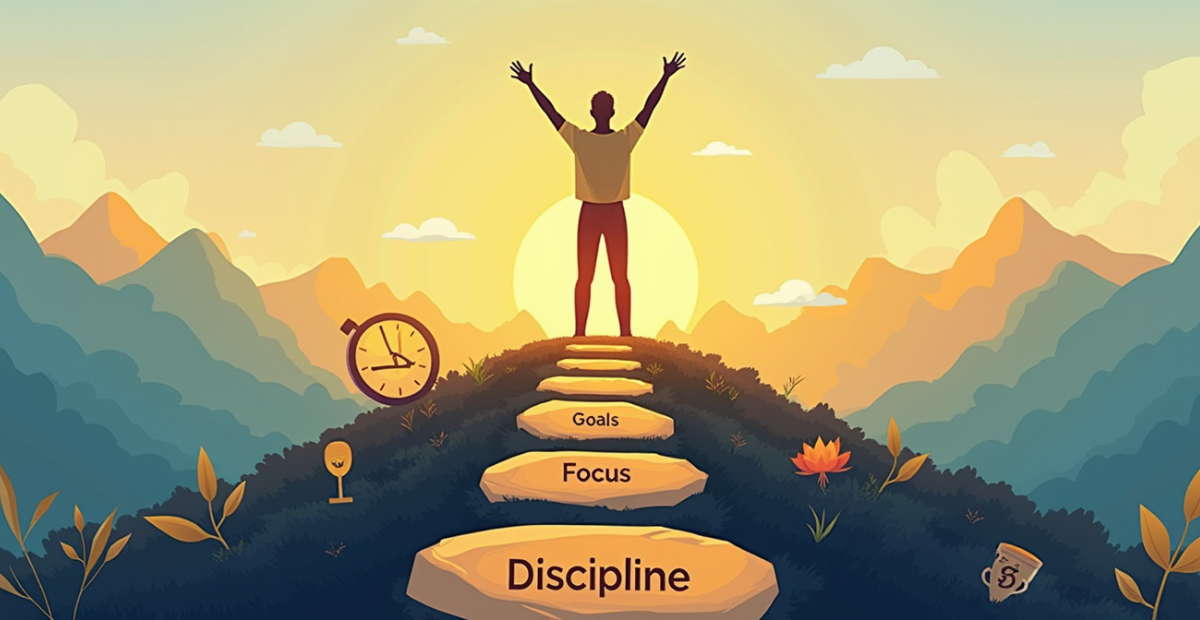The Secret to Self-Discipline: How to Stay Focused and Achieve More
In today’s fast-paced world, where distractions are just a click away, self discipline has become more valuable than ever. Whether you’re working toward career goals, personal projects, or simply trying to form better habits, the ability to stay focused and maintain consistent effort is often what separates success from unfulfilled potential.
But what exactly is self discipline, and why do some people seem to have an abundance of it while others struggle? More importantly, how can you develop this crucial skill to achieve more in your own life?
Understanding Self Discipline: The Foundation of Success
Self discipline isn’t about punishment or restriction—it’s about empowerment. At its core, self discipline is the ability to control your impulses, resist temptation, and stay focused on what truly matters despite distractions or difficulties.
Studies from the American Psychological Association have consistently shown that self-discipline is a stronger predictor of success than IQ. In fact, research published in the Journal of Personality found that self-control (a close relative of self discipline) was more important than intelligence in predicting academic achievement.
The good news? Unlike IQ, self discipline can be developed and strengthened over time.
Why Building Self-Discipline Changes Everything
Before diving into techniques for building self discipline, let’s understand why it’s worth the effort:
- Increased productivity: When you’re able to focus without succumbing to distractions, you accomplish more in less time
- Greater achievement: Self-discipline enables you to persist through challenges and setbacks
- Improved health: From regular exercise to better eating habits, self-discipline supports physical wellbeing
- Enhanced relationships: The impulse control associated with self discipline helps maintain healthy relationships
- Reduced stress: The structure and predictability that come with disciplined habits reduce anxiety and worry
Proven Techniques for Developing Self-Discipline
1. Start With Your Why
Strong self discipline begins with understanding your deeper motivations. When temptation strikes, abstract goals like “being healthier” often aren’t compelling enough to keep you on track.
Instead, identify specific, emotionally resonant reasons for your goals:
- Not just “I want to exercise more,” but “I want to have the energy to play with my kids without getting winded”
- Not just “I want to save money,” but “I want the security of knowing I can handle unexpected expenses without panic”
Research from the University of Rochester shows that intrinsic motivation (doing something because it’s personally rewarding) leads to more sustainable behavior change than extrinsic motivation (doing something for external rewards or pressure).
2. Master the Art of Habit Formation
Self-discipline isn’t about making the right decision every time—it’s about making the right decision automatic through habits.
According to research by Dr. BJ Fogg at Stanford University, the most effective way to build habits is through:
- Starting extremely small: Begin with a “tiny habit” that takes less than 30 seconds
- Anchoring to existing routines: Attach new habits to established ones
- Celebrating immediate success: Create positive emotions around the new behavior
For example, if you want to develop a meditation practice, start with just one minute of meditation after brushing your teeth each morning, then gradually increase the duration as the habit becomes established.
3. Environmental Design: Making Self-Control Easier
One of the most overlooked aspects of staying focused is environmental design. Your willpower is a finite resource, so rather than constantly testing it, create an environment that supports your goals.
Consider these self-control techniques:
- Keep tempting foods out of sight (or out of the house entirely)
- Put your phone in another room while working
- Use website blockers during focused work sessions
- Prepare workout clothes the night before morning exercise
A study in the Journal of Consumer Research found that people who encountered fewer temptations didn’t actually have more willpower—they were simply better at avoiding situations where they needed to use willpower in the first place.
4. Embrace the Power of Incremental Progress
Marathon runners don’t start with 26.2 miles—they build up gradually. The same principle applies to building self discipline.
Start with small, manageable goals that stretch your abilities slightly without overwhelming you. As psychologist Mihaly Csikszentmihalyi’s research on “flow” states suggests, we perform best when challenges slightly exceed our current abilities, creating a sense of productive struggle.
For example, if you currently can’t focus for more than 15 minutes, don’t try to immediately work for two hours straight. Instead, try 20-minute focused sessions, gradually increasing as your focus muscle strengthens.
5. Develop Recovery Strategies
Even the most disciplined individuals have moments of weakness. The difference is that they have strategies for getting back on track quickly.
Create a specific plan for how you’ll respond to lapses in self-discipline:
- If you miss a workout, commit to a 10-minute exercise session the same day
- If you get distracted while working, use the Pomodoro technique (25 minutes of focus followed by a 5-minute break)
- If you overspend, implement a 48-hour cooling-off period for non-essential purchases
Research from the University of Washington shows that people who anticipate obstacles and plan specific responses are significantly more likely to maintain progress toward their goals.
Overcoming Common Obstacles to Self-Discipline
Perfectionism
Paradoxically, perfectionism often undermines self-discipline by creating an all-or-nothing mentality. When you inevitably fall short of perfect standards, it’s easy to give up entirely.
Instead, embrace “good enough” action. Consistency trumps perfection every time when achieving goals with discipline.
Decision Fatigue
Each decision you make throughout the day depletes your mental energy, making self-control more difficult later on.
Combat this by:
- Creating routines for recurring decisions (like what to eat for breakfast)
- Making important decisions in the morning when your energy is highest
- Using decision rules (e.g., “I always exercise on Monday, Wednesday, and Friday”)
Unclear Goals
Vague aspirations like “get in shape” or “be more productive” make it difficult to know what actions to take and when you’ve succeeded.
Instead, create SMART goals (Specific, Measurable, Achievable, Relevant, Time-bound) to provide clear direction for your self-discipline efforts.
How to Maintain Self-Discipline Long-Term
Track Your Progress
What gets measured gets managed. Keeping a record of your efforts and results provides motivation and accountability.
Whether it’s a habit tracker app, a journal, or a simple spreadsheet, find a system that works for you and use it consistently to monitor your journey of building self-discipline.
Build a Support System
Surround yourself with people who support your goals and exemplify the self-discipline you’re working to develop. Research from the Journal of Personality and Social Psychology shows that we naturally adopt the habits and mindsets of those around us.
Consider joining accountability groups, finding a mentor, or simply sharing your goals with supportive friends and family.
Practice Self-Compassion
Perhaps counterintuitively, being kind to yourself when you slip up is crucial for long-term self-discipline. Research by Dr. Kristin Neff shows that self-compassion—not self-criticism—leads to greater motivation and personal growth.
When you inevitably have moments of weakness, speak to yourself as you would to a good friend: with understanding, encouragement, and helpful advice.
Frequently Asked Questions About Self-Discipline
How long does it take to build self-discipline?
While the popular notion that habits take 21 days to form has been debunked, research from University College London suggests that on average, it takes about 66 days for a new behavior to become automatic. However, this varies widely depending on the person and the specific habit.
The key is consistency; even small daily actions compound over time to create significant improvements in self-discipline.
Can some people naturally have more self-discipline than others?
Yes, research indicates there may be genetic components to self-control. However, studies also show that self-discipline is like a muscle that can be strengthened through consistent practice, regardless of your starting point.
What’s the relationship between self-discipline and willpower?
Willpower is the momentary ability to resist temptation, while self-discipline is the consistent application of willpower over time, often supported by habits and systems. Willpower is a limited resource that fluctuates throughout the day, which is why building supportive habits and environments is crucial for sustained self-discipline.
How do I balance self-discipline with self-care?
True self-discipline includes knowing when to push and when to rest. Sustainable progress requires periods of recovery and enjoyment. The most disciplined individuals don’t eliminate pleasure—they learn to enjoy it intentionally rather than impulsively.
Conclusion: Your Path to Greater Self-Discipline Starts Now
Self-discipline isn’t about rigid control or denial—it’s about aligning your daily actions with your deepest values and most important goals. By understanding the science behind habit formation, creating supportive environments, and practicing self-compassion, you can develop the self-discipline needed to stay focused and achieve more in every area of life.
Remember that building self-discipline is a journey, not a destination. Each small victory strengthens your ability to choose what matters most over what feels good in the moment.
What area of your life could benefit most from improved self-discipline? Share your thoughts in the comments below, or check out our article on The Power of Habit Formation for more insights on creating lasting change.
Ready to take the first step? Choose one small action you can take today to move toward your most important goal, and commit to doing it consistently for the next week. That single commitment might just be the beginning of a transformative journey toward greater self-discipline and achievement.
[Author’s note: This article was last updated on March 16, 2025, to reflect the latest research on self-discipline and behavior change.]
Any other feedback or suggestions?
There are no reviews yet. Be the first one to write one.







